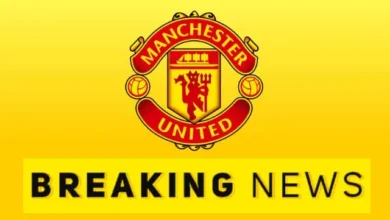The video assistant referee (VAR) has successfully performed their professional knowledge by robbing Manchester United of a goal that was scored by Højlund against Aston Villa. The goal was meant to result in a 1-0 victory for Manchester United.

In a highly anticipated Premier League match between Manchester United and Aston Villa, the use of the Video Assistant Referee (VAR) has once again ignited controversy, drawing attention to its influence on crucial match outcomes. The latest incident involved a disallowed goal that would have given Manchester United a narrow 1-0 victory, sparking intense debate among fans, pundits, and even managers. The center of the controversy was United’s in-form striker, Rasmus Højlund, whose goal was overturned after a lengthy VAR review, leaving many to question the fairness and interpretation of the system.
The game, held at Villa Park, was a fiercely competitive encounter from the opening whistle, with both teams demonstrating disciplined defensive strategies. Manchester United appeared to be the more dangerous side, thanks largely to the presence of Højlund, who has been a standout performer since joining the Red Devils. The Danish forward, known for his strength and finishing prowess, seemed to have delivered the decisive moment when he slotted the ball past Aston Villa’s goalkeeper, Emiliano Martínez, midway through the second half.
As the ball hit the back of the net, Manchester United fans erupted in elation, convinced their team had secured a hard-fought lead in what had been a tense match. Højlund, celebrating his apparent winner, looked every bit the hero as his teammates mobbed him in delight. Yet, this joy would be short-lived. VAR, which has become a mainstay in modern football for its ability to review contentious decisions, was called upon to scrutinize the goal. What followed was a prolonged and, for many, agonizing wait, as the officials carefully examined whether Højlund had been offside in the buildup to the goal.
After several minutes of deliberation, the verdict came in: no goal. Højlund’s effort was chalked off due to what the officials deemed to be a marginal offside position. The disappointment among Manchester United players and fans was palpable. The game, which had appeared to be tilting in their favor, was now level again, and the frustration only grew as the match eventually ended in a goalless stalemate.
The disallowed goal has since sparked widespread debate, with much of the controversy surrounding the precise application of VAR to the offside rule. The issue, as many have pointed out, lies in the razor-thin margins that determine whether a player is onside or offside. In Højlund’s case, replays suggested that only a fraction of his body was ahead of the last defender at the moment the pass was made. Nevertheless, the goal was overturned, leaving Manchester United feeling aggrieved and supporters questioning the fairness of the decision.
Manchester United’s manager, Erik ten Hag, was visibly irritated by the ruling. Speaking in his post-match interview, he emphasized just how significant such marginal decisions can be in the context of a season. “It’s becoming more and more difficult to accept these decisions,” Ten Hag lamented. “When you’re talking about a few centimeters deciding whether you win or draw, it’s hard to take. These moments can define a season.”
Ten Hag didn’t stop there. He also raised concerns about the consistency with which VAR applies the offside rule. According to the United boss, similar situations in other matches have yielded different outcomes, which only adds to the confusion. “We’ve seen other cases where it seems like there’s more leniency, but here, it feels like we were on the wrong end of a harsh call. We just want consistency,” he remarked, echoing the sentiments of many within the footballing community.
On the other side of the pitch, Aston Villa’s manager, Unai Emery, was more philosophical about the decision. Acknowledging that the disallowed goal was a tight call, Emery nevertheless emphasized that his team had played well enough to merit the point. “Football is unpredictable,” he stated. “Sometimes the decisions go your way, sometimes they don’t, but overall, we are pleased with our performance and the result.”
The broader debate over VAR’s role in football is nothing new. Since its introduction into the Premier League, the technology has been met with both praise and criticism. While its primary purpose is to eliminate clear and obvious errors, many argue that the way it has been used—particularly with offside calls—has introduced a level of pedantry that goes against the spirit of the game. Critics contend that the offside rule was originally designed to prevent players from gaining an unfair advantage by goal-hanging, not to penalize players who are ahead of the last defender by a millimeter or two.
For Manchester United, this latest VAR controversy is just one of many grievances the club has faced in recent seasons. The feeling of injustice is strong among supporters, many of whom have taken to social media to vent their frustrations. Calls for reform are growing louder, with some suggesting that more leniency should be afforded to attackers in close offside situations. The current system, they argue, seems to disproportionately favor defending teams, which can lead to unfair outcomes in tight games.
As the dust settles on the goalless draw, the repercussions of the disallowed goal may be felt for some time. Manchester United, who are still struggling to find their form, will be left wondering what might have been. The lost opportunity for three points could prove costly as the race for a top-four finish intensifies. Meanwhile, the debate surrounding VAR will continue to rage, with both fans and teams calling for improvements in its implementation.
While VAR has undoubtedly reduced the number of blatant refereeing mistakes, its role in shaping the outcomes of matches—especially in such pivotal moments—remains under scrutiny. Football, a game of fine margins, is now being decided by the slimmest of measurements, leaving many to question whether the technology is enhancing or detracting from the beautiful game.
In a recent Premier League clash between Manchester United and Aston Villa, the controversy surrounding the Video Assistant Referee (VAR) reignited heated discussions about its impact on match outcomes. The pivotal moment occurred when Manchester United’s Rasmus Højlund had a goal disallowed after a lengthy VAR review, which would have given his team a crucial 1-0 lead. This incident has prompted extensive debate among fans, pundits, and managers alike, particularly regarding the fairness and consistency of the offside rule as interpreted by VAR.
The match, hosted at Villa Park, was fiercely competitive, with both teams displaying solid defensive performances. Højlund, who has been in exceptional form for United, seemed to have broken the deadlock in the second half when he slotted the ball past Aston Villa’s goalkeeper, Emiliano Martínez. The jubilant United supporters erupted in celebration, believing their side had taken the lead in a tightly contested game.
However, that joy was short-lived. VAR intervened to assess the potential offside position of Højlund during the buildup to the goal. After a drawn-out review, officials ruled the goal out, citing a marginal offside. This decision left United players and fans frustrated, as the match ended in a goalless draw, denying them what seemed like a deserved victory.
The incident has sparked widespread discourse regarding the application of VAR, particularly concerning offside decisions. Many observers noted that Højlund appeared to be only slightly ahead of the last defender when the pass was made, raising questions about the precision required to determine offside positions. Critics argue that the rule’s stringent interpretation undermines the spirit of the game, suggesting that it should focus on preventing clear advantages rather than penalizing players for fractional margins.
United’s manager, Erik ten Hag, expressed his discontent with the ruling in his post-match comments, highlighting the significance of such decisions in the broader context of a season. He pointed out the difficulty of accepting outcomes decided by mere centimeters and called for greater consistency in VAR applications, referencing other matches where similar situations yielded different results.
In contrast, Aston Villa’s manager, Unai Emery, took a more philosophical stance, acknowledging the tightness of the call while expressing satisfaction with his team’s performance and the resulting point. His comments underscored the unpredictable nature of football, emphasizing that while decisions may vary, the team had played well enough to deserve their draw.
The broader conversation surrounding VAR’s role in football is ongoing. Since its introduction in the Premier League, it has been both praised for eliminating clear errors and criticized for its sometimes pedantic approach, especially concerning offside calls. Many fans believe that the technology has favored defensive play, with calls for more leniency toward attackers in tight situations growing louder.
For Manchester United, this latest VAR controversy adds to a list of grievances in recent seasons, with supporters voicing their frustrations across social media. The disallowed goal not only stings in the moment but may also impact the team’s pursuit of a top-four finish, as each point becomes increasingly vital in a competitive league.
As discussions continue regarding the efficacy of VAR, its role in shaping match outcomes remains a contentious topic. While it has certainly helped reduce blatant refereeing mistakes, many are left questioning whether its current implementation enhances or detracts from the essence of football, a sport where outcomes can often hinge on the narrowest of margins.








